The Adventure of English (17 page)
Read The Adventure of English Online
Authors: Melvyn Bragg

17. In 1390, the Lollard William Langland published his allegorical poem
Piers Plowman
(written in West Midlands dialect), in which he mocked the excesses of the priesthood.
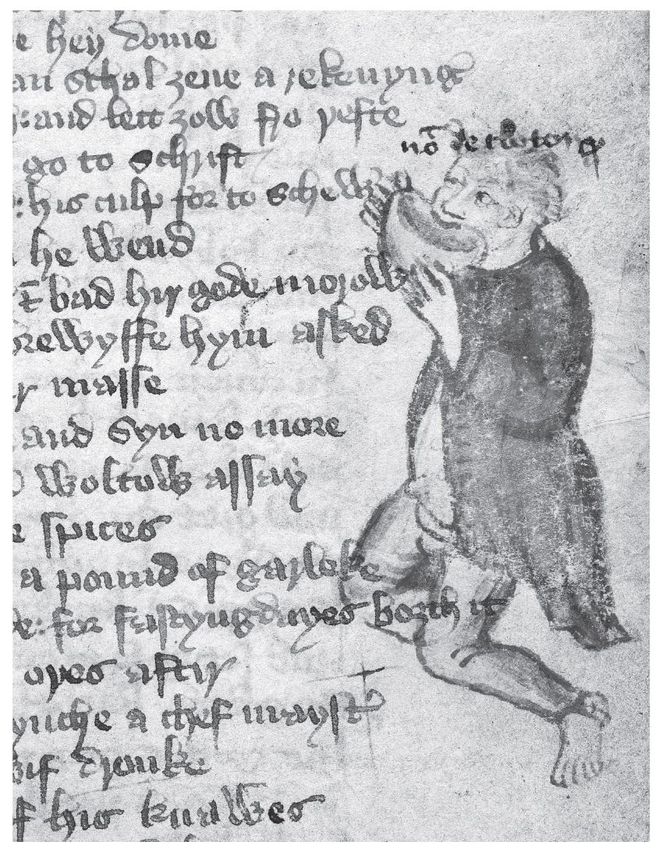
18 and 19. In 1415 Henry V broke with 350 years of royal tradition in writing his dispatches (
below
) from Agincourt in English instead of Latin or French.
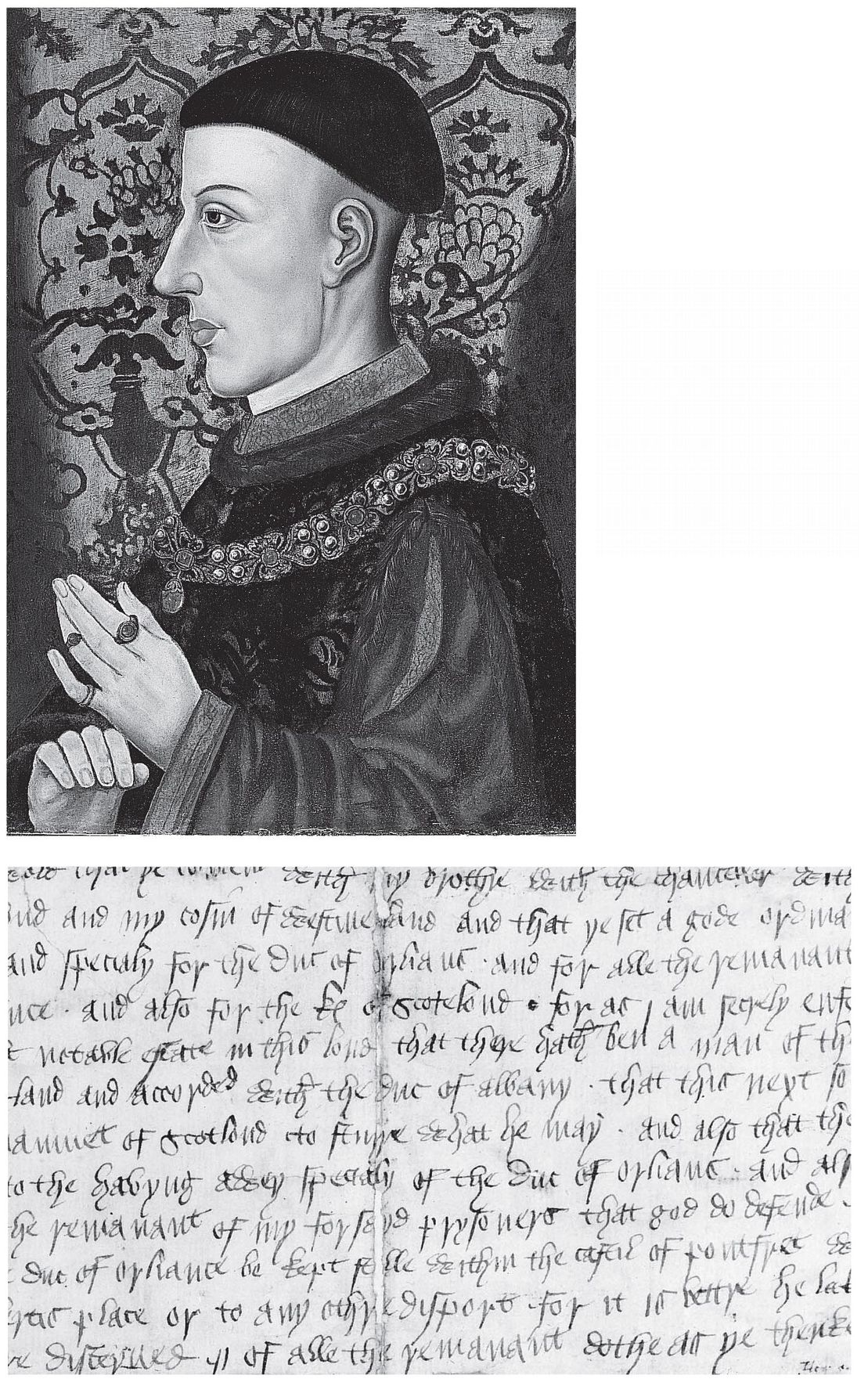
20. The Court of Chancery in Westminster Hall. By the late fifteenth century the Chancery was responsible for the paperwork required to run the kingdom and needed a common written language â and thus English became the language of bureaucracy.
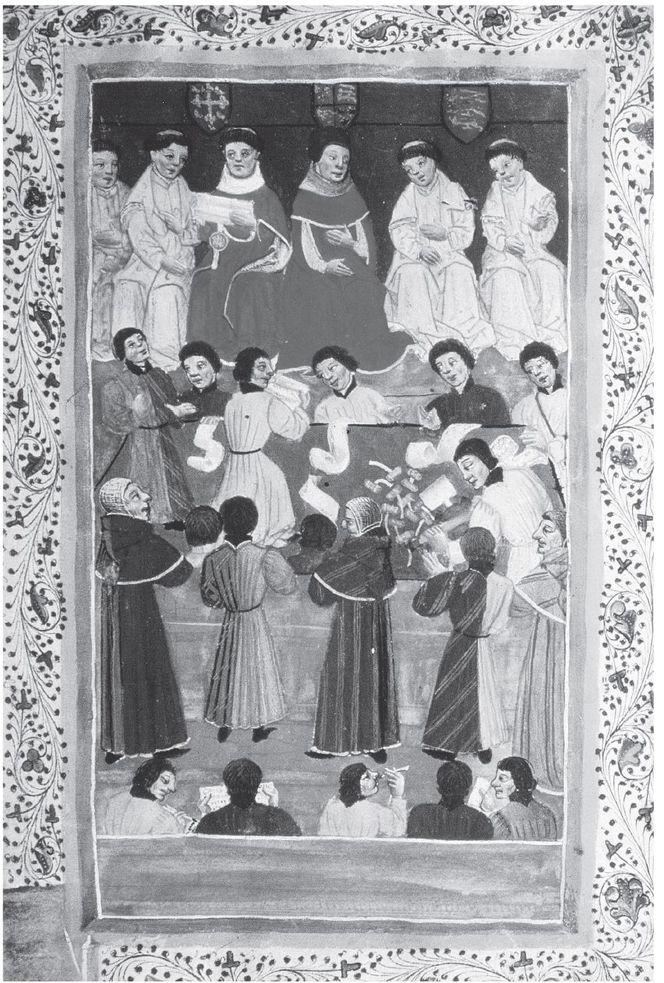
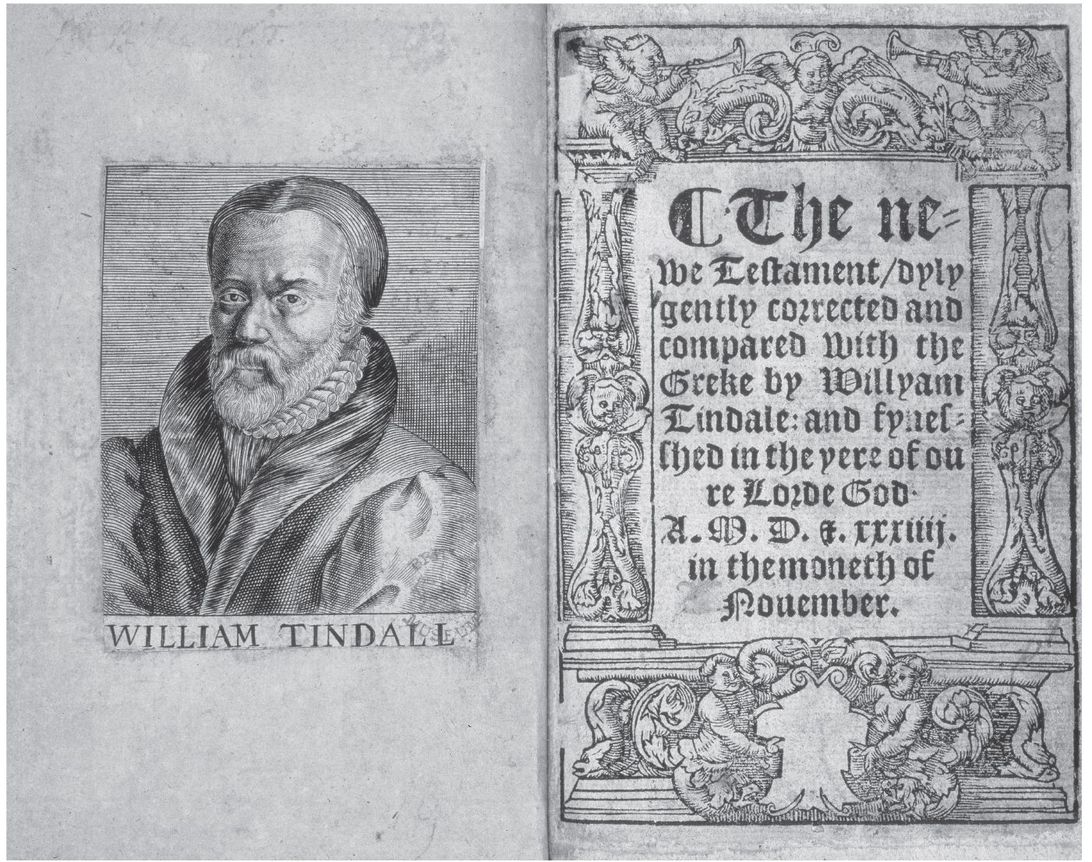
21. Frontispiece and title page of William Tyndale's
Revised New Testament
of 1534, “diligently corrected and composed with the Greke.” He wanted ordinary people to have direct access to God and a Bible in the language of the people.
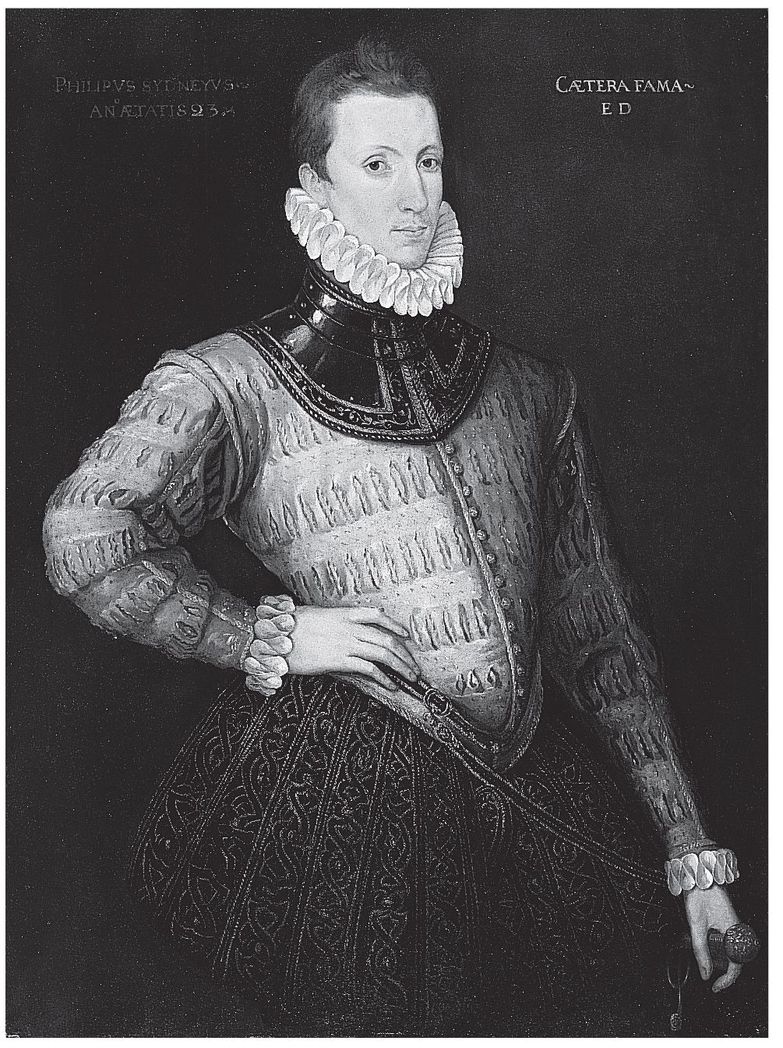
22. Sir Philip Sidney, painted in 1576, the perfect embodiment of the courtier poet.
23. Title page of Robert Cawdrey's
A Table Alphabeticall,
1604, the first English dictionary.
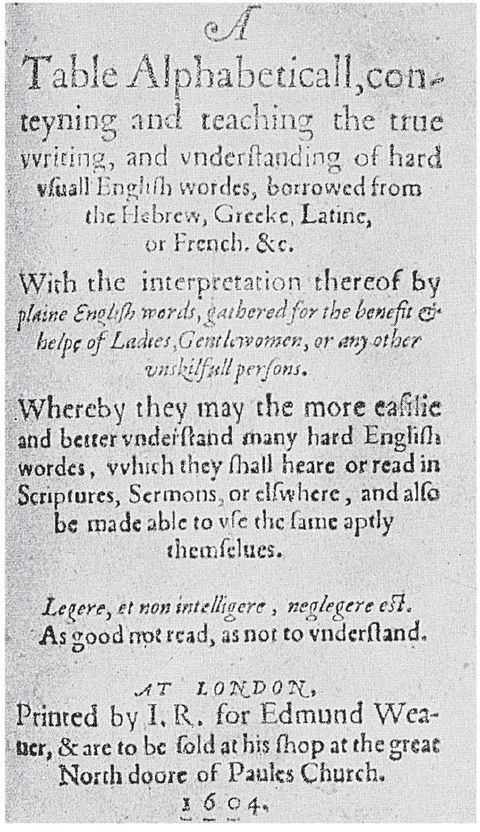
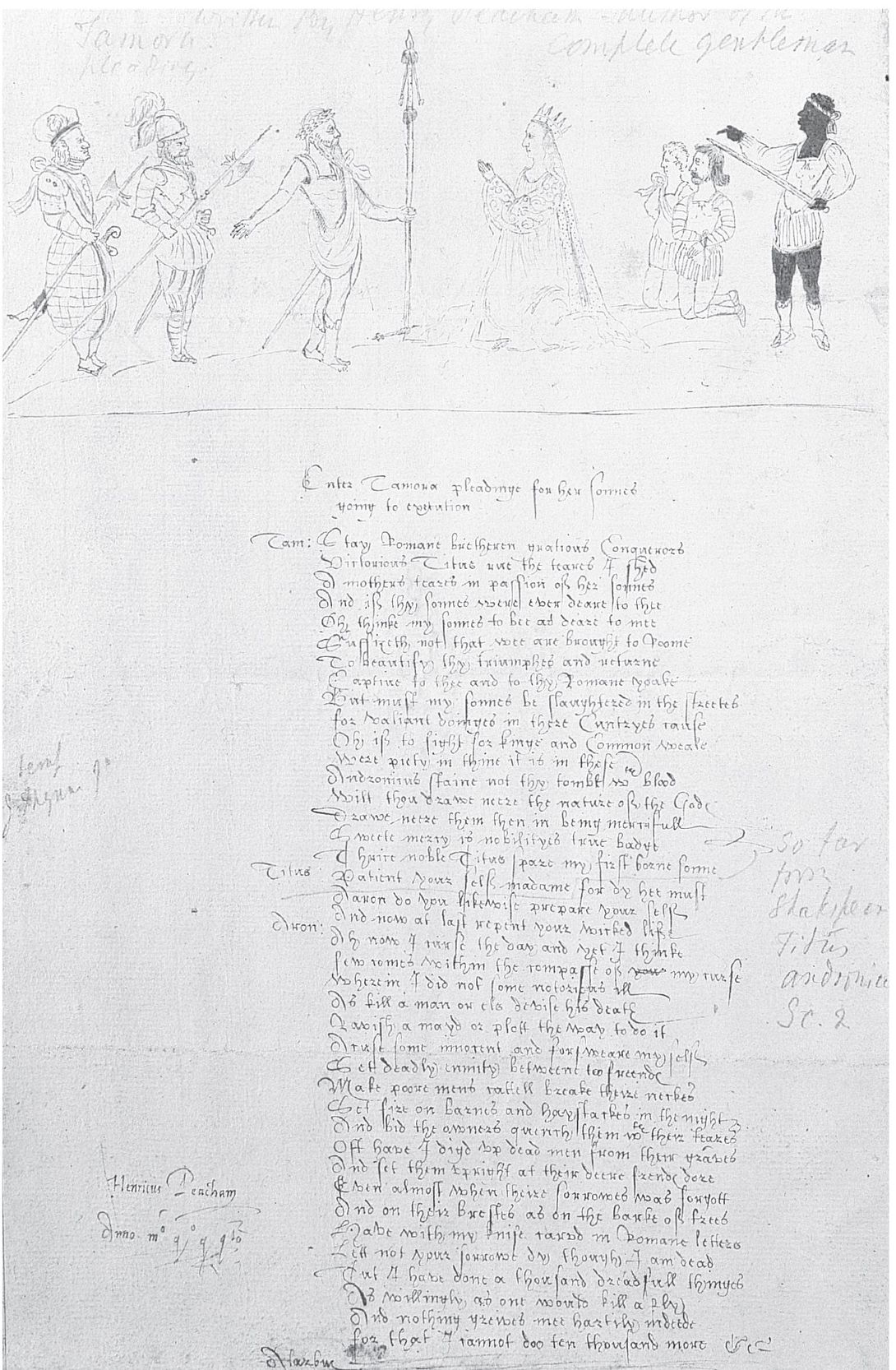
24. The only known contemporary record of a Shakespeare play,
Titus Andronicus,
on stage, drawn by Henry Peacham c. 1594. It has been estimated that a boxoffice hit like this would have been seen by one in two men in London.
These stages became a public crucible of English and the playwrights of the period transformed the turbulent mixed and still unsettled English language that they were reading and hearing. They combined the rich vocabulary and poetry and charmed voices of the courtiers with the slang and sensation and vulgar quick-fire action of the commoners. Because the theatres of the time had no scenery and barely any props, language was the means of choice on the stage to captivate the audience. The scene was set for Shakespeare.
The plays that were written by Shakespeare as well as those by his contemporaries, Marlowe, Jonson, Marston and Chapman, and later Webster and Middleton, attracted a truly incalculable proportion of the population of London. The Globe could hold between three thousand and three thousand five hundred people â and there were five other theatres in London which could rival the Globe. A ten-day run for a play counted as a long run and the London population of merely two hundred thousand inhabitants demanded constant novelty, especially as theatre-going became such a craze that most of those who wanted to had seen the play in the ten days. It has been estimated that a box-office hit like Shakespeare's
Titus Andronicus
would have been seen by one in two men in London.
English's seeding of words was no longer restricted to the courtier-poets and the scholars. In the theatre it had come into the open and now it faced the people. It was ready to take on the world. All the world was now, for English, a stage.
Shakespeare's English
A
mateur scholars may have their uses but they need special indulgence in writing about Shakespeare. So much has been written about him and so well, from his contemporaries, Ben Jonson and Thomas Freeman, to our contemporaries, Harold Bloom and Sir Frank Kermode. Not only have fellow poets and playwrights written about him, but so have historians, psychologists, politicians, philosophers, sociologists, scientists, novelists, satirists, screenwriters, composers, columnists, linguists of many shades of meaning, antiquarians, actors and amateurs of many persuasions and delusions. He is not only thought to be the greatest writer the world has seen but the most written-about writer the world has ever known, for his chroniclers and commentators spill over global tongues, German, Italian, Spanish, French, Dutch, Russian, Japanese, Hindi; unroll the map. He is in more than fifty languages. He was not for an age but for all time, was the boast and the prophecy, and so far it has been fulfilled.
In the eighteenth century, Dr. Johnson took a calmer perspective and a broader sweep:
From the authors which rose in the time of Elizabeth [he wrote], a speech might be found adequate to all purposes of use and elegance. If the language of theology were extracted from Hooker and the translation of the Bible; the terms of natural knowledge from Bacon; the phrases of policy, war and navigation from Raleigh; the dialect of poetry and fiction from Spenser and Sidney; and the diction of common life from Shakespeare, few ideas would be lost to mankind for want of English words in which they might be expressed.
No one could deny the truth of that and yet time has eroded interest in some of those disciplines and swollen interest in others, as fashion has changed and the selectivity of our hindsight scythes down the contenders. Only Shakespeare of those mentioned remains as pre-eminent in our consciousness, as the others have faded or at best held steady in the case of Spenser and Sidney. It is sufficient, I hope, to look at the works of Shakespeare in order to see, at this hinge time of English, where the language had come to since the Frisian invasion of the fifth century and what shape it was in as it set out west again, to America.
Shakespeare was born in Stratford-upon-Avon in 1564. His father, John, was a glover (there are more than seventy detailed and accurate references to gloves in his works); his mother, Mary Arden, came from a farming family. He was the eldest of three sons and four daughters and was educated locally until he was fifteen or sixteen. What happened to him until he landed in London in around 1591 is unclear, save that in 1582 he married Anne Hathaway (he was eighteen) and they had three children. Did he work for his father? Did he join a group of strolling players? Did he go off to the war in France or the Netherlands? Did he become a tutor in a large Roman Catholic and subversive household in Lancashire? Was his father secretly a Catholic, which was extremely dangerous under Protestant Elizabeth with all the Popish plots against her? His principal teacher in the local grammar school was part of a Catholic circle which shadowed Stratford â but like much else this scrapes together fragments and jigsaws them into pictures constantly challenged by other conjectures.
At the beginning of the 1590s he arrived in London as an actorwriter. It was the year in which the still lamented English aristocratic hero-poet Sir Philip Sidney's
Astrophel and Stella
was posthumously published and the gallants and the university wits were caught in a fever of sonneteering. Shakespeare, who without coy misrepresentation can I think be described at this time as just another young man up from the sticks, who had left wife and family behind to chance his arm in the booming city, subject to sneers by the university wits for his lack of an Oxbridge education, unleashed sonnets to match and beat the best of them at their own game. Sonnets were his duelling ground, his language laboratory and his visiting cards. He was new, from Warwickshire, “uneducated,” a ragtaggle actor, but, in print, a poet.
Shall I compare thee to a summer's day?
Thou art more lovely and more temperate:
Rough winds do shake the darling buds of May,
And summer's lease hath all too short a date:
Sometime too hot the eye of heaven shines,
And often is his gold complexion dimm'd.
And every fair from fair sometime declines,
By chance, or nature's changing course untrimm'd;
But thy eternal summer shall not fade,
Nor lose possession of that fair thou ow'st;
Nor shall Death brag thou wander'st in his shade,
When in eternal lines to time thou grow'st;
So long as men can breathe, or eyes can see,
So long lives this, and this gives life to thee.
This sonnet strikes a very confident note about the author's view of his talent. He is writing “eternal lines”: and as long as anyone can breathe or see, they will read what he has written. Perhaps the remark of that university wit, Richard Greene, playwright, that Shakespeare was, among other things, “an upstart Crow” came not only from envy but from a certain exasperation with the new star's cockiness. A cockiness which was justified, which made it worse! For other of Shakespeare's contemporaries were very soon cheering him on. “Honey-tongued Shakespeare,” John Weever wrote in 1599 when Shakespeare had been in London for less than a decade. “When I saw thine issue, I swore Apollo got them, and none other.” Apollo, the sun god, was appropriate: Shakespeare claimed himself as “A man on fire for new words.” The association between fire and words is expressed most tellingly at the beginning of
Henry V:
O! for a Muse of fire, that would ascend
The brightest heaven of invention.
Most scholars today attribute thirty-eight plays, one hundred fifty-four sonnets and other major poems to Shakespeare. He brought us characters who describe those we know: Falstaff, Kate, Polonius, Iago; figures from history, more memorable than their “true” historical counterparts: Richard III, King Lear; dramas and plots still produced and as dramatic today:
Macbeth, Othello, Hamlet.
You can scale Shakespeare by many routes: here we concentrate on his contribution to English. Well over two thousand of our words today are first recorded by him, either plucked out or invented by him.
Although he may or may not have invented them, the words “obscene,” “accommodation,” “barefaced,” “leap-frog,” and “lack-lustre” are just a few of those which make their first appearance in his work. Again we can see how words like “obscene” and “accommodation,” for instance, once identified and put in print, bred many lines. It is as if a new word, if it strikes a deep chord in our minds, is immediately rooted to feed itself, to grow, to seek out more and more areas and nuances of expression, to bring back news to the mother-ship, to release a part of the brain just waiting for that word. Other words that make their first appearance include “courtship,” “dextrously,” “indistinguishable,” “premeditated” and “reliance.”
Over four hundred years ago, Shakespeare had a vocabulary of at least twenty-one thousand different words: some have estimated that with the combination of words, this could have reached thirty thousand. Comparisons are entertaining: the King James Bible of 1611 used about ten thousand different words. The average educated man today, more than four hundred years on from Shakespeare with the advantage of the hundreds of thousands of new words that have come in since his time, has a working vocabulary of less than half that of Shakespeare.
The language at that time was in flux: Shakespeare must have made it dizzy. He “out-Heroded Herod”; “uncle me no uncle,” he said, he would “dog them at the heels” â just one of the astonishing, simple transferences of a common observation, a dog at someone's heels, into a phrase which could be menacing, funny, admirable, pestering: and it is clinchingly memorable.
Shakespeare shoved into bed together words that scarcely knew each other before, had never even been introduced. He coupled “ill” with “tuned” â “ill-tuned” it was and is and ever more shall be. “Baby” suddenly found itself hitched to “eyes” and “baby-eyes” hit the page. “Smooth,” unaware of its new mate, was joined with “faced” and the “smooth-faced” appeared among us. “Puppy” met “dog.” In the sixteenth century people began to start their sentences with “oh,” “why” and “well” as “pray,” “prithee” and “marry” began to die off. Shakespeare was on to them. Almost every word could be used as almost any part of speech. There were no rules and Shakespeare's English ran riot.
If the stature of a writer depends on his quotability then Shakespeare appears to be unmatchable. “To be or not to be, that is the question” is known around the world. It is probably the best known quotation in any language ever.
“What the dickens?” has nothing to do with Charles but makes its first appearance in
The Merry Wives of Windsor;
“as good luck would have it” â that does too. It “beggar'd all description” and “salad days” are two of many still alive lines from
Antony and Cleopatra.
He coined so many of the expressions we use today but “brevity is the soul of wit,” so I won't play “fast and loose” or refuse to “budge an inch,” but “in one fell swoop” let this paragraph like “all our yesterdays” vanish into “thin air.”
Hamlet,
as has been observed, is full of quotations, more than any other of his plays: “the play's the thing,” “in my mind's eye,” “though this be madness yet there is method in it.” We can be “cruel only to be kind,” serve up “caviar to the general” and “hold the mirror up to nature.” But “more in sorrow than in anger” this “primrose path of dalliance” must come to an end and “the rest is silence.”
It is not the purpose of this book to examine the ideas in Shakespeare any more than it is to investigate his historical research or his relationship with other writers of the time. But as has been mentioned, words can stand for ideas. Words are both an expression of and a report on the human condition. Shakespeare abundantly exemplifies and demonstrates this. In
Hamlet,
for example, one phrase “to thine own self be true” began to explore the notion of personal identity, the study of which has intensified since his day to an extent that even he might not have been able to predict. The great soliloquies express dynamic shifts in states of mind. Drama can be internal. He is saying no less than â this is how we think and how we think is itself dramatically rich. In Greek drama, the long soliloquies were expositions of a fixed state or an argument. Here Shakespeare is turning the mind into itself and making discoveries materially paralleled in the “opening up” of the world by the West Europeans. He takes on thought as a subject.
Emerson wrote: “What point of novels, of manners, of economy, of philosophy, of religion, of taste, of the conduct of life, has he not settled? What mystery has he not signified his knowledge of? What office, or function, or district of man's work, has he not remembered? . . . What maiden has not found him finer than her delicacy? . . . What sage has he not outseen?”
And there are those like Harold Bloom who even argue that the whole of the English-speaking sensibility, even the whole of modern sensibility since Shakespeare, has been moulded by him and from him it fed into all the other Renaissance languages.
In many ways Stratford-upon-Avon itself defined Shakespeare's use of the English language. In the second half of the sixteenth century, it had fifteen hundred inhabitants, and as the son of a local businessman involved with everyone in the place, Shakespeare from the start would have known about the high and the low and lived among the middle. The local language would still have been rough-tongued, uttering its Old English openly: the roots of English would have been in his ears in his infancy.
At the local grammar school which, despite one of those absences of hard evidence so frustrating to Shakespearean scholars, it can safely be assumed he attended, he would have studied the masters of classical Latin literature, Cicero, Virgil, Horace and Ovid. He would have been taught in English by teachers whose own vocabulary would be drenched in the classics and streaked throughout with the thousands of words from the French. In the Upper Form, where to this day and in that same room, students at Stratford School learn their Latin, it would have been forbidden to speak in English, only Latin. Ovid's
Metamorphoses
was especially influential and the alleged description by Jonson of his having “small Latine and lesse Greek” seems a bit harsh with regard to the Latin. It appears that he picked up some French and Italian later in his life: with his ear for mimicry, the cosmopolitan nature of the London he moved in, and facing up to, perhaps goaded by, the swagger of those who had visited those countries, that would seem very likely.
He would also have heard written English and at length from the Bible. His father was publicly criticised for being lax in his churchgoing, but for a boy of Shakespeare's age and background attendance at church, which was compulsory, could scarcely have been ducked for long if at all. At home it seems the family would have had the Bishops' Bible and then the Geneva Bible. The Great Bible was placed in every parish church. It was based on the Matthew Bible, which was based largely on Tyndale's translation. Thomas Cranmer wrote a preface to it and it became known as “Cranmer's Bible.” He would also have known the Book of Common Prayer.
Perhaps scholars can track to their Bible source some of the expressions and attitudes in Shakespeare. For a youth so evidently sensitive to language, it must have been influential. Especially as, newly liberated into English, the words might have been read with passion and freshness and authority. It was prepared as a preacher's Bible â well as of truth. This was a language to reckon with. It could be that this unacknowledged education was as important as anything learned on the hard school bench. In Holy Trinity Church in Stratford, it is good to think that in some measure Tyndale was speaking directly to Shakespeare.
